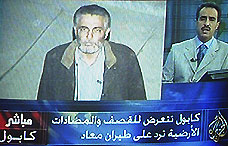|
|
|
The
end of the "scenario"?
Al-Jazeera welcomes its war
correspondent Tayseer Alyoni, home...
by Tarek Atia
(cairolive.com, November 24, 2001) Now that the Qatari satellite channel's
offices in Kabul had been bombed by the US, its Afghanistan correspondent
Tayseer Alyoni's phase of the war was over.
The Taliban had been routed -- and with that Alyoni and al-Jazeera's exclusive
coverage of that side of the battle. With the US-backed Northern Alliance
accompanied by every news organization in the world, each city's fall meant that
not only was actual territory being lost by the Taliban, but media territory as
well.
Alyoni and Al-Jazeera had become focal points in the post-September 11 world --
just like the cliched scenario of an action film, the evil enemy had an outlet
for his televised threats, via Al-Jazeera.
Thus, in the same way the US was fighting bin Laden, CNN was fighting al-Jazeera.
(The fact that there has also been some sort of mutually beneficial partnership
between the two channels also provides another interesting parallel between bin
Laden and the US.) And in the same way that CNN has its wolf -- Wolf Blitzer,
that is, the bearded correspondent who rose to fame (as did the channel)
covering Iraq and the Gulf War -- Alyoni is Jazeera's Wolf. A daring reporter
appearing calm via satellite as the night sky lit up with bomb strikes, one of
which, in the end, would bring his office (where, he also tells the audience, he
used to live) to the ground in a collapse of rubble.
A fitting end, to be sure, one that couldn't have been better scripted. Now
Alyoni is back in Doha at the channel's headquarters. He seems relaxed sitting
in the studio being interviewed by another al-Jazeera presenter about his
experiences. The phone line is opened up, and calls are taken from viewers
around the world. No matter where they are -- in the US, in Egypt, in Saudi
Arabia, in Europe -- each of the callers takes the time to thank Alyoni for his
daring coverage, offering their congratulations on his safe return.
One man wants to know whether Alyoni thinks bin Laden really did it.
 He takes all the questions in stride,
playing the star well, and looking more like a confident actor here in the
studio than he did as a weary correspondent on the grainy via satellite feed
from Kabul. He takes all the questions in stride,
playing the star well, and looking more like a confident actor here in the
studio than he did as a weary correspondent on the grainy via satellite feed
from Kabul.
No, he doesn't think bin did it.
He cites the tremendous technical know-how it must have taken to hijack 4 planes
at the same time. He calls the Arab and Islamic world backwards, and says bin
Laden never admitted he did it. Plus, if the US hasn't presented any evidence
linking bin Laden, where would he get it from?
As he speaks of his experiences, the word "scenario" keeps creeping
into Alyoni's descriptions of events. "We were expecting that
scenario," he says of the US strikes. "We had considered the
possibility of that scenario," he says of Taliban and Northern Alliance
massacres after the fact.
Although most likely unintentional, the use of the word "scenario" by
someone who was so close to the ground during this war is somewhat jarring -- it
only serves to fuel the Arab and Islamic world's collective imagination
regarding whether or not puppet strings were being pulled all along here.
Alyoni admits that his rapid escape from Afghanistan was in fear of Northern
Alliance retaliation -- after all, his channel did seem to be the mouthpiece of
the Taliban, even though Alyoni keeps saying he was no close friend of the
Taliban.
In any case, he says, he wants to go back eventually, mainly because he feels a
strong affinity for the Afghan people.
Go to cairolive.com's complete coverage of the terror
aftermath

Disclaimer
and Terms of Use
© Copyright 1996-2005 cairolive.com. All Rights Reserved
|
|

Read
Tarek Atia's web log
Find
out how
the world media sees Egypt...
UPDATED DAILY!

The ultimate
East-West
world-view

Instant Arabic headlines
|
|